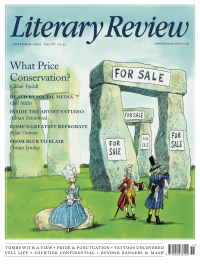Kathy O’Shaughnessy
Dickens in the Trailer Park
Demon Copperhead
By Barbara Kingsolver
Faber & Faber 548pp £20
Barbara Kingsolver grapples with testing subjects. In The Lacuna she wrote about revolutionary Mexico and Cold War America. In The Poisonwood Bible she showed a Christian missionary getting it hilariously, tragically wrong in the Congo. Her latest novel tackles poverty and drugs in hillbilly America. She’s also doing something new: rewriting David Copperfield.
The narrator hero is a young boy known as Demon (his real name is Damon), who lives with his ex-junkie single mother in a trailer in Virginia. The solace in his life is the family next door, the Peggots. Mrs Peggot has a heart of gold, taking in all the strays from her own extended family, including her grandson, Maggot, who is Demon’s best friend. Here Demon is given meals, treats and even clothes.
But then Demon’s mother gets married. Taking the place of Dickens’s Mr Murdstone is Stoner, with ripped abs, a shaved head and veins that protrude when he’s violent (which is often). A reign of terror begins for mother and child, with Demon no longer allowed to go to the Peggots. He starts getting bullied and beaten in the trailer and his mother overdoses. The social services become involved. Where can Demon live? He can’t stay with the Peggots, as Stoner has lied to the social services, implying that they molested Demon. But Demon’s face and body show evidence of Stoner’s violence. So Demon goes to his first foster home.
The Copperfield skeleton provides a powerful narrative structure and Kingsolver makes the most of it. Just as she provided the reader with a visceral sense of the Congo jungle in The Poisonwood Bible, she describes ten-year-old Demon’s arrival at his foster home with unsettling plausibility. His two caseworkers,

Sign Up to our newsletter
Receive free articles, highlights from the archive, news, details of prizes, and much more.@Lit_Review
Follow Literary Review on Twitter
Twitter Feed
Though Jean-Michel Basquiat was a sensation in his lifetime, it was thirty years after his death that one of his pieces fetched a record price of $110.5 million.
Stephen Smith explores the artist's starry afterlife.
Stephen Smith - Paint Fast, Die Young
Stephen Smith: Paint Fast, Die Young - Jean-Michel Basquiat: The Making of an Icon by Doug Woodham
literaryreview.co.uk
15th-century news transmission was a slow business, reliant on horses and ships. As the centuries passed, though, mass newspapers and faster transport sped things up.
John Adamson examines how this evolution changed Europe.
John Adamson - Hold the Front Page
John Adamson: Hold the Front Page - The Great Exchange: Making the News in Early Modern Europe by Joad Raymond Wren
literaryreview.co.uk
"Every page of "Killing the Dead" bursts with fresh insights and deliciously gory details. And, like all the best vampires, it’ll come back to haunt you long after you think you’re done."
✍️My review of John Blair's new book for @Lit_Review
Alexander Lee - Dead Men Walking
Alexander Lee: Dead Men Walking - Killing the Dead: Vampire Epidemics from Mesopotamia to the New World by John Blair
literaryreview.co.uk